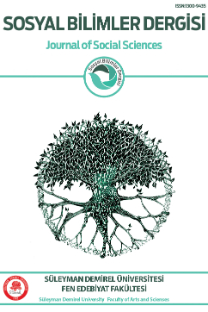Türkiye’de Yerli ve Suriyeli Kadınlar Arasında Hemcins Rekabeti
Türkiye’deki Suriyeliler üzerine yapılmış birçok çalışma, Suriyeli kadınların çok fazla süslendiklerine, bu alışkanlığın altında da onların yerli erkekleri elde etme isteği olduğuna dair yaygın bir tepkinin olduğunu ortaya koysa da konuyu özel olarak ele alan bir çalışma henüz verilmiş değildir. Makale, konuyu tartışmaya açmakla bu boşluğu bir nebze doldurma gayretindedir. Çalışmada konu, biyolojik ve psikolojik boyutuyla çokça tartışılmasına rağmen, sosyoloji, antropoloji ve feminist çalışmalarda pek fazla ilgi gösterilmeyen “cinsel rekabet” boyutuyla ele alınmaktadır. Çalışmanın üç amacı bulunmaktadır: Birincisi, olguya sosyolojik bir çerçeve çizmektir. Darwin’in “cinsel seçim” kuramının bir parçası olan “cinsel rekabet”, daha ziyade birçok canlı türünde ortak olan bazı davranışları tanımlamak için kullanıldığından insana özgü (sosyolojik) boyutu geri planda kalmıştır. Her ne kadar birçok canlı türünde cinsel rekabette fizyolojik olarak güçlü olmak ya da karşı cinsin dikkatini cezbedecek bazı biyolojik vasıflara sahip olmak önemli bir avantaj sağlasa da insanlar bunların yerine ikame eden para, prestij, mevki gibi daha birçok araca sahiptir. Bu anlamda konu, Pierre Bourdieu’nun “sermaye” kavramlaştırması üzerinden ele alınmaktadır. Biyoloji-merkezli bakışın diğer önemli bir sorunu da cinsel rekabeti daha çok erkekle özdeşleştirmesidir. Bu özdeşliğin bir nedeni de kadınlar arası rekabetin çoğunlukla, pasif ve iffetli kadını makbul sayan ataerkil kodlarla ciddi bir çelişkiye girmeyecek şekilde verilmesidir. Bu noktayı açıklamak için konu James Scott’un “pasif direniş” fikri bağlamında tartışılmaktadır. Çalışmanın ikinci bir amacı ise, olguya dair feminist suskunluğu tartışmaya açmaktır. Bu noktada, tarihsel olarak inşa edilen ataerkilliğin cinsel anlamda kadın öznelliğini yadsıması eğiliminin söz konusu suskunluk üzerindeki rolü sorgulanmaktadır. Üçüncü olarak da cinsel rekabetin yaşanma biçimine dönük kültürel farklılıkları ortaya koymaktır. Böylelikle, genelde Suriyeli kadının suçlanması üzerinden algılanan yerli kadın mağduriyetinin altındaki sosyo-tarihsel arka planının anlaşılmasını amaçlamaktadır.
Anahtar Kelimeler:
cinsel rekabet, Suriyeli kadınlar, erotik sermaye, sermayenin kurtarıcı işlevi, sermayenin tatmin işlevi, cinsel rekabet, Suriyeli kadınlar, erotik sermaye, sermayenin kurtarıcı işlevi, sermayenin tatmin işlevi
Intrasexual Competition Between Syrian and Local Women in Turkey
Although many studies on Syrians in Turkey reveal that there is a widespread reaction that Syrian women adorn themselves in an excessive way and believed that this habit is due to their desire to acquire local men, none has specifically addressed the issue. The article tries to fill this gap to some extent by putting the subject under discussion. In the study handled the subject with the dimension of "sexual competition", which is though discussed widely with its biological and psychological dimensions, but not so much draw attention in sociology, anthropology, and feminist studies. As a part of Darwin's theory of "sexual selection", “sexual competition” has been used to describe certain behaviors common to many living species, so its human (sociological) dimension has remained in the background. Although in many living species to be physiologically strong or to have some biological characteristics that will attract the attention of the opposite sex, yield an important advantage in sexual competition, humans have many other tools such as money, prestige and status that compensate them. To this end, the subject is discussed through Pierre Bourdieu's conceptualization of "capital". Another important problem of the biocentric view is that it identifies sexual competition more with men. One reason for this identification is that the competition between women is often presented in a way that does not come into serious conflict with the patriarchal codes that regard passive and chaste women as persona grata. To explain this point, the subject is discussed in the context of James Scott's idea of "passive resistance". A second aim of the study is to open the feminist silence about the phenomenon up for discussion. At this point, is questioned the role of the historically constructed patriarchal tendency ignoring female subjectivity in terms of sexuality on this silence. Thirdly, is to reveal the cultural differences in the way sexual competition is experienced. Thus, it aims to understand the socio-historical background underlying the victimization of local women, which is generally perceived through the accusation of Syrian women.
Keywords:
sexual competition, Syrian women, erotic capital, the saving function of capital, the satisfying function of capital, sexual competition, Syrian women, erotic capital, the saving function of capital, the satisfying function of capital,
___
- kaynakça referans
- ISSN: 1300-9435
- Yayın Aralığı: Yılda 3 Sayı
- Başlangıç: 1995
- Yayıncı: Süleyman Demirel Üniversitesi, Fen-Edebiyat Fakültesi
Sayıdaki Diğer Makaleler
Türkiye Akademisyenlerinde Göç Algısı ve Suriyeli Göçmenlere Yönelik Önyargı İlişkisi
Kültür Savaşı Ekseninde 12 Eylül Politikaları ve Türk Sağı
İbrahim Sârim Paşa’nın Mısır Meselesindeki Yeri Ve Faaliyetleri
Yaşlılara Yönelik Dijital Yetkinlik Envanterinin Geçerlik ve Güvenilirlik Çalışması
Çağlar ÖZBEK, Özgür ULUBEY, Müge ADNAN, Nurhayat KOCATÜRK KAPUCU
XVI. Yüzyılın İlk Yarısında Sincar Sancağı’nın Demografik ve Ekonomik Durumu
Dayton Barış Antlaşmasının İdealizm ve Realizm Teorileri Kapsamında Değerlendirilmesi
Vefa Saygın ÖĞÜTLE, Duygu SARIMURATOĞLU
Türkiye’de şehirleşme deneyimleri: Sosyo-mekânsal görünümler
Meksika Devrimi ve Kadın Hakları
